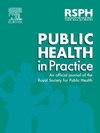Local authorities need tailored research ethics processes to support research capacity building
IF 1.9
Q2 PUBLIC, ENVIRONMENTAL & OCCUPATIONAL HEALTH
引用次数: 0
Abstract
Background
Local authorities (LAs) are increasingly aiming to become more research active. Research ethics review is an important prerequisite of high-quality research. It is not clear what a LA ethics review process can (or should) look like, or whether it is needed in addition to external review processes. We aim to describe the scope and purpose of research ethics processes in LAs across England, and factors that are salient to their design.
Study design
Qualitative interview study.
Methods
Staff from 15 LAs in England were recruited to describe their research ethics process using purposeful and snowball sampling. One-hour interviews were conducted using a topic guide with five scenarios, drawn from LA projects. Interview transcripts were thematically analysed using a consensus building process among the research team.
Results
Factors salient to the design of research ethics processes in LAs included: definitions of research, research ownership, and the distinct relationship LAs have with research participants. A typology with four models is used to describe existing processes. These models are: No Process; The Assurance Model (where LAs assure an external ethics committee has reviewed projects); The Advice Model (where there is no formal review, but ethical considerations are made through formal and informal advice); and The Review Model (where LAs establish their own formal internal ethics committees). These typologies emerged from divergent understandings of the role of research in LAs and can reflect varied views of research as an activity “done to a local authority”, “done with a local authority” or “owned by a local authority”.
Discussion
Research ethics processes in LAs need to reflect various LA approaches to what constitutes research, who owns the research process, and how a LAs relationship with research participants may vary from other settings. As LAs continue articulating what research means in their setting, they need support and guidance to establish research ethics processes that enable research activity, while simultaneously being sensitive to the level of research readiness and distinct LA need.
地方当局需要有针对性的研究伦理程序来支持研究能力建设
背景:地方当局(LAs)正越来越多地致力于变得更加活跃的研究。研究伦理审查是高质量研究的重要前提。目前还不清楚洛杉矶伦理审查过程可以(或应该)是什么样子,或者除了外部审查过程之外是否需要它。我们的目标是描述整个英格兰的研究伦理过程的范围和目的,以及他们的设计突出的因素。研究设计定性访谈研究。方法采用有目的的滚雪球抽样方法,招募了英国15所大学的工作人员来描述他们的研究伦理过程。一个小时的采访使用了一个主题指南,其中有五个场景,来自洛杉矶的项目。在研究团队中使用共识建立过程对访谈记录进行主题分析。结果研究伦理过程设计的重要因素包括:研究的定义、研究所有权以及研究人员与研究参与者的不同关系。使用具有四个模型的类型学来描述现有流程。这些模型是:无流程;保证模式(法律顾问保证由外部道德委员会审查项目);建议模式(没有正式的审查,但通过正式和非正式的建议进行道德考虑);以及审查模式(联盟建立自己的正式内部道德委员会)。这些类型学产生于对研究在地方政府中的作用的不同理解,可以反映对研究作为“对地方当局完成”、“与地方当局一起完成”或“由地方当局拥有”的活动的不同看法。laas的研究伦理过程需要反映不同的laas方法,包括什么是研究,谁拥有研究过程,以及laas与研究参与者的关系如何与其他设置不同。随着实验室不断阐明研究在其环境中的意义,他们需要支持和指导,以建立研究伦理过程,使研究活动能够进行,同时对研究准备水平和独特的实验室需求敏感。
本文章由计算机程序翻译,如有差异,请以英文原文为准。
求助全文
约1分钟内获得全文
求助全文

 求助内容:
求助内容: 应助结果提醒方式:
应助结果提醒方式:


